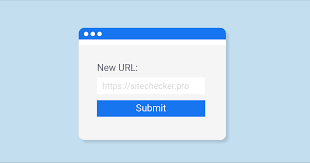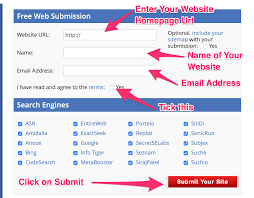Submitting URL to Search Engines: A Comprehensive Guide
In the vast landscape of the internet, submitting your website’s URL to search engines is a crucial step towards increasing your online visibility. By ensuring that search engines index your site, you enhance the chances of potential visitors discovering your content.
Here are some key steps to follow when submitting your URL:
- Create a Sitemap: Before submitting your URL, it’s beneficial to create a sitemap of your website. This XML file provides search engines with a roadmap of all the pages on your site, making it easier for them to index your content.
- Register with Webmaster Tools: Most search engines offer webmaster tools that allow you to submit and monitor your website’s performance. Registering with these tools can provide valuable insights into how search engines view and rank your site.
- Submit Your URL: Once you have a sitemap and are registered with webmaster tools, you can proceed to submit your URL directly to search engines. Each search engine has its own submission process, so be sure to follow their guidelines carefully.
- Monitor Indexing: After submitting your URL, monitor the indexing process to ensure that all pages on your site are being crawled and indexed by search engines. Regularly check webmaster tools for any errors or issues that may affect indexing.
Remember that submitting your URL is just the first step in improving your website’s visibility. To maximise results, focus on creating high-quality content, optimising for relevant keywords, and building quality backlinks from reputable sites.
In conclusion, submitting your URL to search engines is an essential part of establishing a strong online presence. By following these steps and staying proactive in monitoring and optimising your site, you can increase the likelihood of attracting organic traffic and growing your digital footprint.
Essential FAQs on Submitting Your URL to Search Engines
- 1. How do I submit my URL to search engines?
- 2. Is it necessary to submit my website’s URL to multiple search engines?
- 3. What is the importance of creating a sitemap before submitting my URL?
- 4. Do all search engines offer webmaster tools for monitoring website performance?
- 5. How long does it take for a submitted URL to be indexed by search engines?
- 6. What should I do if my submitted URL is not being indexed by search engines?
- 7. Are there any specific guidelines or best practices to follow when submitting URLs to search engines?
1. How do I submit my URL to search engines?
One of the most frequently asked questions regarding the process of submitting a URL to search engines is, “How do I submit my URL to search engines?” To submit your URL effectively, you can start by creating a sitemap of your website and registering with webmaster tools provided by search engines. Once these steps are completed, you can proceed to directly submit your URL to the respective search engines following their specific submission guidelines. It’s important to monitor the indexing process afterwards to ensure that all pages on your site are being crawled and indexed correctly. By following these steps diligently, you can enhance your website’s visibility and increase its chances of being discovered by potential visitors through search engine results.
2. Is it necessary to submit my website’s URL to multiple search engines?
When it comes to submitting your website’s URL to search engines, the question of whether it is necessary to submit to multiple search engines often arises. While it is not mandatory to submit your URL to every search engine individually, it can be beneficial to do so. By submitting to multiple search engines, you increase the chances of your website being indexed across various platforms, potentially reaching a wider audience. However, focusing on high-quality content, proper SEO techniques, and regular updates may be more impactful in the long run than submitting to multiple search engines. Ultimately, the decision to submit to multiple search engines depends on your specific goals and resources.
3. What is the importance of creating a sitemap before submitting my URL?
Creating a sitemap before submitting your URL to search engines is crucial for ensuring efficient and thorough indexing of your website’s content. A sitemap acts as a roadmap that helps search engine crawlers navigate through your site’s pages more effectively. By providing a structured outline of all the pages on your website, including their relationships and priority levels, a sitemap enables search engines to discover and index your content more efficiently. This, in turn, enhances the chances of your web pages appearing in search results, ultimately improving your online visibility and increasing the likelihood of attracting relevant organic traffic to your site.
4. Do all search engines offer webmaster tools for monitoring website performance?
Not all search engines offer webmaster tools for monitoring website performance. While popular search engines like Google and Bing provide comprehensive webmaster tools that allow website owners to submit URLs, monitor indexing status, and receive valuable insights, other search engines may not have equivalent platforms. It’s important for website owners to research the specific tools and features offered by each search engine to effectively monitor and optimise their website’s performance across different platforms.
5. How long does it take for a submitted URL to be indexed by search engines?
The time it takes for a submitted URL to be indexed by search engines can vary depending on various factors. Generally, search engines like Google, Bing, and others have their own algorithms and processes for crawling and indexing websites. In some cases, it may take a few days to a few weeks for a submitted URL to appear in search results. Factors such as the quality of the content, website structure, backlinks, and overall site authority can influence the indexing speed. It’s important to regularly monitor webmaster tools for updates on indexing status and make sure your website follows best practices for search engine optimisation to expedite the process.
6. What should I do if my submitted URL is not being indexed by search engines?
If your submitted URL is not being indexed by search engines, there are several steps you can take to troubleshoot the issue. Firstly, ensure that your website is accessible and free from any technical errors that may hinder indexing. Check for issues such as robots.txt blocking search engine crawlers or meta tags preventing indexing. Additionally, review your content to ensure it is relevant, unique, and of high quality. Consider resubmitting your URL through webmaster tools and monitor for any error messages or notifications that may provide insights into why the indexing process is failing. Lastly, be patient as indexing can sometimes take time, especially for new websites or pages with low authority. By addressing these factors and staying proactive in monitoring and optimising your site, you can increase the chances of your URL being successfully indexed by search engines.
7. Are there any specific guidelines or best practices to follow when submitting URLs to search engines?
When it comes to submitting URLs to search engines, adhering to specific guidelines and best practices can significantly impact the indexing and visibility of your website. It is essential to ensure that your website follows search engine guidelines for content quality, relevance, and technical aspects such as meta tags, sitemaps, and mobile-friendliness. Additionally, focusing on creating unique and valuable content, using relevant keywords strategically, and obtaining backlinks from reputable sources can enhance the effectiveness of your URL submissions. By following these best practices diligently, you can improve your website’s chances of ranking higher in search engine results pages and attracting more organic traffic.




